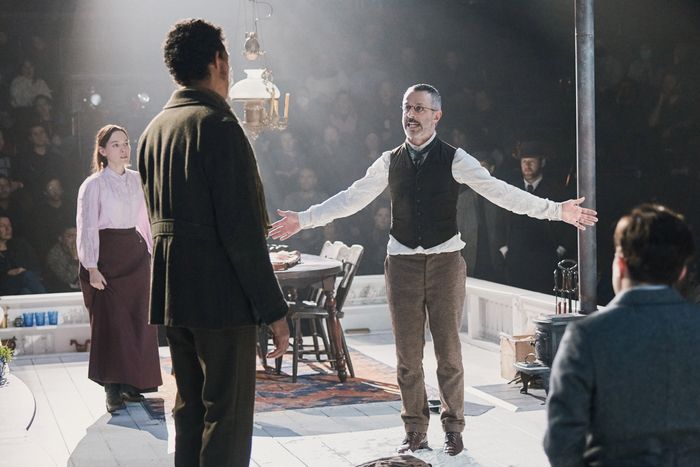
This article originally appeared in the Stage Whisperer newsletter. To receive the newsletter each week in your inbox, sign up below.
The biggest theatrical event of the past week happened inside of another piece of theater. On the evening of Thursday, March 14, three protesters from the climate-activist group Extinction Rebellion stood up during a town-meeting scene in a press preview of An Enemy of the People to interrupt the play with speeches of their own about the climate crisis — imploring the audience to believe scientists, calling attention to the harsh sentences for activists Timothy Martin and Joanna Smith (arrested for smearing paint on a Degas in the National Gallery), and repeating the phrase “No theater on a dead planet.”
“This play highlights that climate activists are not the enemy,” Laura Robinson, a spokesperson for the group, said in a statement. “But why are we being treated as such?”
Watching the events play out, you might have initially assumed, as I did in the audience, that this was a meta-theatrical intrusion within the production. In that scene in the play, Jeremy Strong’s character, Dr. Stockmann, is arguing that his Norwegian town’s spas need to be shut down because their waters are contaminated, but he’s being blocked by the town’s political elite, led by their mayor, who is his brother (played by Michael Imperioli). The town meeting comes after a brief intermissionlike pause during which An Enemy of the People serves Linie aquavit from a (heavily branded) onstage bar and invites some audience members to sit onstage as the ensemble sings Norwegian folk songs. The lights stay up during the ensuing scene, and when the activists started to speak, the cast appeared to respond in character. Imperioli, seemingly acting like the mayor, heckled and forcibly pushed one of the activists up the stairs of the theater. Strong, acting like Dr. Stockmann, responded to one protester by saying, “He’s right.” As the action continued, however, it became very clear that this was an unplanned intrusion. Ushers pulled the activists up the stairs, and later on an NYPD officer appeared in the back of the theater. Once the activists were removed, the audience, somewhat disconcertingly, erupted in applause. One of the activists, Nate Smith, spoke with Time Out New York about their approach, and I recommend reading that story. (“Theater has a long history of answering to social times, but I don’t want there to be confusion of ‘we’re attacking the art,’’’ he said.)
But I was also curious about what was going through the actors’ heads during the event, so I went to the opening-night party for the production — which, yes, had gallons of Linie at the bar — to ask. Imperioli told me that he, too, initially thought that his director might have planted the protesters. “We kept trying to make that intermission more chaotic,” he said, “so I thought maybe this is that, and I was just like, All right, I’m the mayor now.” The actor insisted that his actions — pushing a protester up the stairs; shouting “Go back to drama school!” at another — stemmed from being in character and that he felt as if the mayor might take charge to try to get rid of a protester. “If I wasn’t playing the mayor, I would not have done that,” Imperioli said, and he added that he got in touch with the activists and patched things up afterward. “Looking into their faces, they were very passionate about something that was extremely important,” he said. “I thought it was kind of beautiful.”
Strong, for his part, told me his response didn’t come as much from trying to stay in character as remaining consistent with his own beliefs. “I’m doing a play about a character who is trying to awaken people to an imminent ecological catastrophe,” he said, “so I personally felt I wouldn’t have the right to finish the play if I had tried to stifle or silence what they had to say, which I think is correct and deserved to be heard.” He pointed out that interruptions are not ideal, comparing his experience to being knocked off while walking a tightrope. But he felt that the intrusion ultimately magnified what the play is about. “If anything, it maybe taught me the what of the play and the why of the play,” he said. “They chose us for a reason, and I feel honored that they chose us, although I hope they don’t do it again.”


